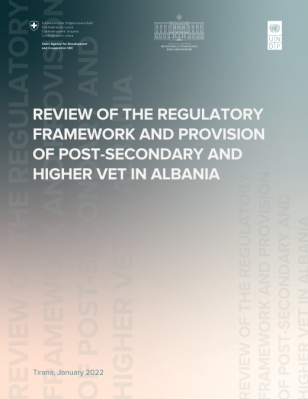Review of the Regulatory Framework and Provision of Post-Secondary and Higher VET in Albania
Review of the Regulatory Framework and Provision of Post-Secondary and Higher VET in Albania
May 30, 2022
International experiences show that post-secondary education and training is a pertinent and valuable educational option, contributing to better skills of young students without work experience, and employees who want to improve their educational levels to gain a better position in the job market. International experiences also show that post-secondary professional programs systems require proper regulation and adequate attention from the public authorities in the field of education to make them visible and recognised. A critical point is that educational institutions and employers must work together to ensure that education programmes are relevant for the present and future skills needs of employers.
However, while the number of post-secondary study programs and enrolled students continues to grow, the Albanian practice falls short on all three accounts: regulation is imperfect, attention from public authorities is insufficient and the relationships between educational institutions and employers are minimal. There is insufficient orientation of education to the needs of the labour market; curricula are too theoretical, practical training of students is weak, and learning on the job is not well organised. The conclusion is that the current post-secondary system needs to be improved so that it better caters for the needs of the labour market and the students.
This study conducted on post-secondary programs in three selected sectors (ICT, tourism and construction) confirms the potential of post-secondary programs and shows show that most of the surveyed companies are interested to cooperate with the educational providers in the design, delivery and assessment of post-secondary programs. However, what clearly emerges is that the cooperation until now is minimal (limited to internships) and that there is a series of challenges that needs to be addressed so that post-secondary programs are recognized and the benefits of work-based learning practices become evident to all relevant actors.

 Locations
Locations